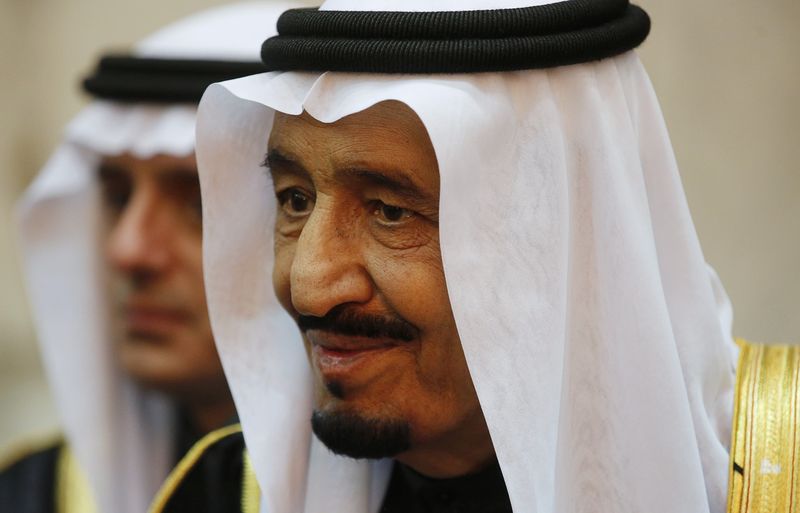By Angus McDowall
RIYADH (Reuters) - In making a blaze of largesse and the dismissal of relatively liberal clerics two of his first acts as monarch, Saudi Arabia's King Salman has signalled his approach to big future challenges may differ from that of his liberalising late brother.
On the face of it, those moves suggest a partiality for religious conservatism and the buying of political support - both traits that seem to contradict the modernising reforms the kingdom says it wants.
While the truth is likely to be more complex than that, the moves hint at how Salman might tackle Saudi Arabia's looming demographic challenge, which threatens to undermine the ruling family's legitimacy at a moment of unprecedented regional chaos.
"Traditionalists and modernists grew apart during King Abdullah's time. But Salman had excellent relations with both sides and each thinks the new king is behind him," said Khalil al-Khalil, an academic and writer at Imam Saud University, the country's most influential seminary.
"I expect we'll see conservatives start to test the boundaries and see what they can get away with under the new regime," said a diplomat in the Gulf.
However, it is far from clear if Salman really will slow, or even reverse, Abdullah's liberalising reforms, which are popular with many young Saudis.
Saudi Arabia's unspoken social contract – that its people owe the king obedience in return for public services, comfortable living standards and a government that rules in accordance with Islamic tenets – is at risk.
Fast population growth means spending on citizens must be constrained, while increasing access to the outside world means liberals and conservatives alike now challenge the idea of dynastic rule.
For Salman, those risks are more urgent than ever because of the rise of Islamic State, whose jihadist fighters boast they will inspire an uprising in Saudi Arabia to unseat the Al Saud.
The late King Abdullah attempted to preserve his family's rule with reforms aimed at creating private sector jobs and by gradually liberalising society by loosening Islamic restrictions. He also clamped down hard on political dissent.
It is too early to say what Salman's vision is, but a series of decrees last week gave some indications, including the sacking of Justice Minister Mohammed al-Issa and Religious Police chief Abdulatif Al al-Sheikh, sworn foes of Saudi conservatives.
Those decrees also splurged around $20 billion (13 billion pounds) in bonus payments to citizens and streamlined an unruly bunch of ministerial committees into just two, one to handle security issues and the other economic issues.
TESTING THE BOUNDARIES
In times of trouble, the Al Saud have always been more worried about the risk of a conservative Muslim uprising than about Western criticism or anger among liberal Saudis.
Abdullah approached that challenge by confronting the religious elite, upon whom the Al Saud depend for some of their legitimacy, and pushing them to accept reforms to the Sharia judiciary, education and women's rights.
Issa, the justice minister, was decried by conservatives in petitions to the monarch for promoting "the Westernising stench of reform", while Al al-Sheikh's departure was applauded by members of the morality police, who publicly celebrated on Friday.
Conservatives may see Salman's move to dismiss the pair as a step back from the late king's liberalising tendency. They will also be pleased by his decision to reappoint as an adviser to the court Saad al-Shethri, an ultra conservative sacked by Abdullah in 2009 for opposing a co-educational university.
Yet the changes in support of conservatives may not be as deep as the initial headlines suggest.
The new justice minister, Walid al-Samaani, "is from the same school as Issa. They both came from the Board of Grievances and served on the same committees. Sheikh Issah himself supervised Samaani's PhD," said Majed Garoub, a lawyer with close ties to the former justice minister.
ECONOMIC REFORM
Any move to placate conservatives by backpeddling on women's rights would retard economic development too, because of the need for a big increase in Saudis of both sexes working for the private sector instead of depending on government salaries.
King Salman has not yet fleshed out his plans for reducing Riyadh's dependency on oil revenues over the long term or for moving Saudis into some of the 8 million jobs held by foreigners.
His award of two months bonus salaries and pensions last week appeared to take a page straight from the old, fiscally irresponsible playbook of decades ago.
But economists pointed out that unlike Abdullah's move upon becoming king in 2005 of raising public sector salaries, Salman's decree will only dent the budget this year and not impact future spending.
Meanwhile, his decision to keep in place the active Labour Minister Adel al-Faqieh suggests he will continue a big drive to get more Saudis into work, and merging two education ministries might mean a revival of reform efforts in that direction.
Another possible wave of reforms might be aimed not at resolving those long term issues, however, but at making the state provide better services and reduce corruption, say people who know the new king.
Deputy Crown Prince Mohammed has already shown how improving services might be possible in the Interior Ministry, where he pushed through e-government programmes that made many procedures slicker.

Salman may hope that similar efforts in other parts of the state will make life more comfortable for his subjects and therefore secure Saudi Arabia's leadership against challengers without causing more tension between liberals and conservatives.